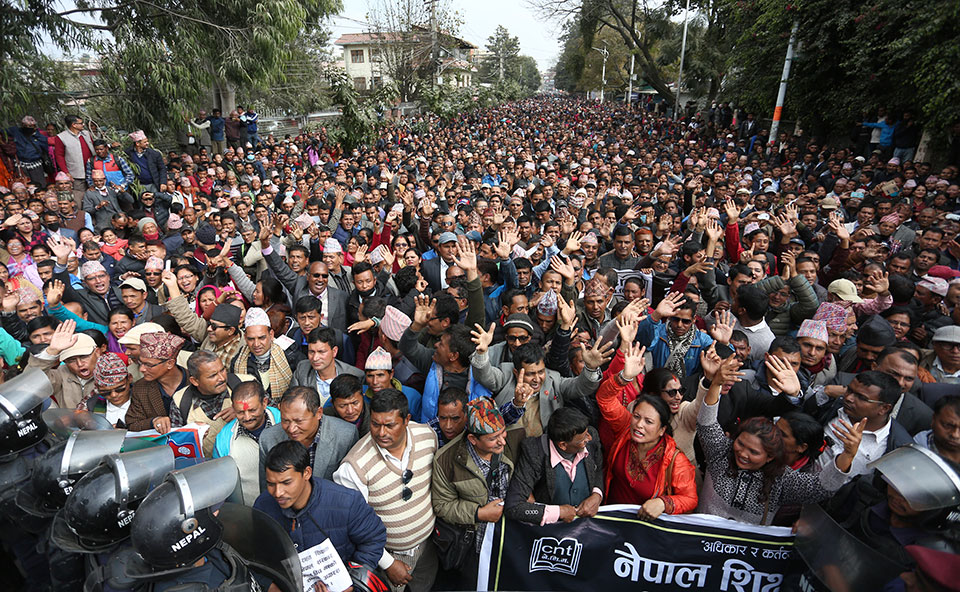
Government and Teachers’ Federation Near Agreement
The Government of Nepal and the Nepal Teachers’ Federation are close to agreeing. After 28 days of protests in Kathmandu, teachers engaged in a dialogue with the Ministry of Education on Tuesday night and reached a preliminary understanding on a potential agreement framework.
Focus of Agreement and Government Commitments
According to a participating teacher, the agreement involves the government addressing certain demands through Cabinet decisions, pledging to expedite the parliamentary approval of the School Education Bill under consideration in the Education and Health Committee, and the teachers suspending their street protests.
The teachers have proposed a list of nine demands requiring Cabinet decisions, while the Ministry of Education has proposed seven points. A ministry official stated that the dialogue revolved around these key issues. “The Cabinet will take some decisions to address the teachers’ concerns. Discussions also covered a commitment to passing the School Education Bill through the Parliament and political mechanisms. Once that is ensured, the teachers are expected to suspend their protests and return to schools,” the official said. The Ministry of Education will draft and submit the proposal for Cabinet decision accordingly.
Participants and Ongoing Dialogue
On the government’s side, participants in the dialogue included Education Minister Raghubir Pant, Finance Minister Bishnu Paudel, Home Minister Ramesh Lekhak, and Education Secretary Deepak Kafle. President Laxmikishor Subedi, Vice President Nanumaya Parajuli, and General Secretary Tulabahadur Thapa were present from the federation's side. Parajuli noted that the discussion focused on the demands requiring Cabinet decisions. She added, “If the Cabinet commits to a timeline for issuing the law along with approval of the federation’s nine-point proposal, the protest will take a new form.”
She said that if the agreed-upon decisions are finalized, teachers will return to classrooms and resume exams and academic activities.
Economic and Political Assurance
During the meeting, Finance Minister Paudel committed to ensuring the financial resources required to meet the teachers' demands. According to the teachers' leaders, Home Minister Lekhak clarified the ruling party’s preparation for issuing the education law.
The Cabinet proposal includes provisions such as:
-
Granting sick leave benefits to temporary and relief teachers,
-
Providing healthcare facilities at civil service hospitals for teachers and school staff,
-
Ensuring minimum salaries for child development teachers,
-
Adjusting the grading system for teachers,
-
Granting remote and local allowances to relief teachers,
-
Including teachers in the Social Security Fund,
-
Determining the official hierarchy for teachers.
The Ministry of Education estimates that implementing these proposals will require about NPR 8 billion. Former Education Minister Bidya Bhattarai had previously initiated the same proposal, but the Ministry of Finance's lack of approval prevented Cabinet endorsement. Bhattarai resigned, citing a lack of cooperation from Prime Minister KP Sharma Oli and Finance Minister Paudel.
Timeline and Future Protest Plans
Education Minister Pant and representatives of the Teachers’ Federation met on Monday. After positive discussions, both sides resumed talks on Tuesday. Before the talks, leaders from the ruling parties, Congress and UML, discussed the teachers’ demands and the government's response.
Both parties—the government and protesting teachers—indicated an agreement could be reached within a day or two.
Before sitting for the talks, the Teachers’ Federation held a meeting and decided to continue the dialogue and protest in parallel. According to the federation, the nature of the protest will be determined after Cabinet-level decisions and legal assurance of the Education Act. If partial demands are met, the federation will suspend the educational strike and limit the protest to symbolic programs. However, the demand for issuing the Education Act remains their “bottom line.” Until then, symbolic protest activities will continue in one form or another.


